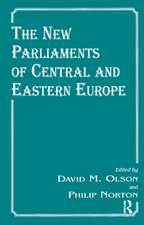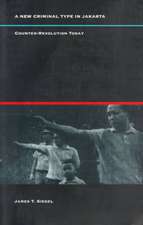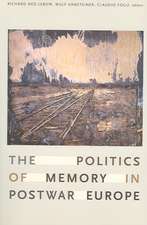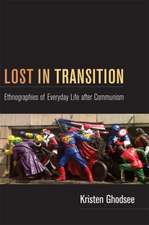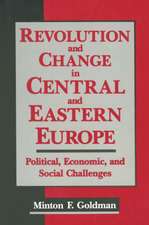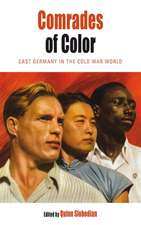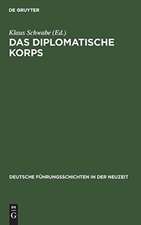Foreign Front – Third World Politics in Sixties West Germany: Radical Perspectives
Autor Quinn Slobodianen Limba Engleză Paperback – 20 mar 2012
Din seria Radical Perspectives
-
 Preț: 215.97 lei
Preț: 215.97 lei -
 Preț: 202.18 lei
Preț: 202.18 lei -
 Preț: 193.33 lei
Preț: 193.33 lei -
 Preț: 265.20 lei
Preț: 265.20 lei -
 Preț: 302.74 lei
Preț: 302.74 lei -
 Preț: 308.90 lei
Preț: 308.90 lei -
 Preț: 302.36 lei
Preț: 302.36 lei -
 Preț: 303.11 lei
Preț: 303.11 lei - 23%
 Preț: 887.39 lei
Preț: 887.39 lei -
 Preț: 299.29 lei
Preț: 299.29 lei -
 Preț: 306.77 lei
Preț: 306.77 lei -
 Preț: 263.29 lei
Preț: 263.29 lei -
 Preț: 262.70 lei
Preț: 262.70 lei -
 Preț: 229.20 lei
Preț: 229.20 lei -
 Preț: 301.20 lei
Preț: 301.20 lei -
 Preț: 266.18 lei
Preț: 266.18 lei -
 Preț: 262.70 lei
Preț: 262.70 lei -
 Preț: 306.99 lei
Preț: 306.99 lei -
 Preț: 265.20 lei
Preț: 265.20 lei -
 Preț: 302.96 lei
Preț: 302.96 lei -
 Preț: 303.88 lei
Preț: 303.88 lei - 9%
 Preț: 668.08 lei
Preț: 668.08 lei -
 Preț: 253.07 lei
Preț: 253.07 lei
Preț: 263.29 lei
Nou
Puncte Express: 395
Preț estimativ în valută:
50.39€ • 52.28$ • 42.11£
50.39€ • 52.28$ • 42.11£
Carte tipărită la comandă
Livrare economică 17-31 martie
Preluare comenzi: 021 569.72.76
Specificații
ISBN-13: 9780822351849
ISBN-10: 0822351846
Pagini: 320
Ilustrații: 24 photographs
Dimensiuni: 156 x 230 x 24 mm
Greutate: 0.43 kg
Editura: MD – Duke University Press
Seria Radical Perspectives
ISBN-10: 0822351846
Pagini: 320
Ilustrații: 24 photographs
Dimensiuni: 156 x 230 x 24 mm
Greutate: 0.43 kg
Editura: MD – Duke University Press
Seria Radical Perspectives
Recenzii
"...this is an excellent addition to the ever-expanding canon of 1960s studies. Slobodian breathes life into the relationship between West German and Third World students as it existed not in the imagination, but on the ground. By examining this interaction, he illuminates the myriad ways in which the Third World enlivened West German radicalism, and the various contributions that these students made to the movement. - Zachary Scarlett, H-Diplo, August 2012
"This carefully researched and well written book convincingly brings the foreign students and international influence back into the story of the 1960s in Germany. Peter C. Caldwell, author of Love, Death, and Revolution in Central Europe: Ludwig Feuerbach, Moses Hess, Louise Dittmar, Richard Wagner
"The topic is fascinating; the core thesis is provocative; the research is stellar; and the writing is wonderful. This is a bold, exciting book that can and will get a lot of attention. Jeremy Varon, author of Bringing the War Home: The Weather Underground, the Red Army Faction, and Revolutionary Violence in the Sixties and Seventies
"Quinn Slobodians Foreign Front is an important contribution to our understanding of the place that the Third World occupied in the imagination of the West German student movement. In particular, Slobodian provides an excellent account of the role that students from Africa, Asia and Latin America played in the West German New Left in the 1960s as he discusses the complex relationship between intellectuals in the West and revolutionaries in the Third World. - Hans Kundnani, Times Literary Supplement, January 2013
"This impressive and timelymicrohistory traces the roots of 1960s and 1970s West German radicalism back to the encounter between a generation of student activists with a cohort of Third World students who came to the Federal Republic early in the 1960s. Slobodian challenges the common assumption that the consciousness and the tactics of the Achtundsechziger were variations on an international theme learned from external exemplars such as the Berkeley Free Speech Movement. He argues that the West German model of youth revolt displayed a particular orientation towards ThirdWorld experience and praxis, from its developing phase, through the early andmid-1960s, into its awful maturity in the 1970s." - Social Anthropology/Anthropologie Sociale, May 2013
"...this is an excellent addition to the ever-expanding canon of 1960s studies. Slobodian breathes life into the relationship between West German and Third World students as it existed not in the imagination, but on the ground. By examining this interaction, he illuminates the myriad ways in which the Third World enlivened West German radicalism, and the various contributions that these students made to the movement." - Zachary Scarlett, H-Diplo, August 2012 "This carefully researched and well written book convincingly brings the foreign students and international influence back into the story of the 1960s in Germany." Peter C. Caldwell, author of Love, Death, and Revolution in Central Europe: Ludwig Feuerbach, Moses Hess, Louise Dittmar, Richard Wagner "The topic is fascinating; the core thesis is provocative; the research is stellar; and the writing is wonderful. This is a bold, exciting book that can and will get a lot of attention." Jeremy Varon, author of Bringing the War Home: The Weather Underground, the Red Army Faction, and Revolutionary Violence in the Sixties and Seventies "Quinn Slobodian's Foreign Front is an important contribution to our understanding of the place that the Third World occupied in the imagination of the West German student movement. In particular, Slobodian provides an excellent account of the role that students from Africa, Asia and Latin America played in the West German New Left in the 1960s as he discusses the complex relationship between intellectuals in the West and revolutionaries in the Third World." - Hans Kundnani, Times Literary Supplement, January 2013 "This impressive and timelymicrohistory traces the roots of 1960s and 1970s West German radicalism back to the encounter between a generation of student activists with a cohort of Third World students who came to the Federal Republic early in the 1960s. Slobodian challenges the common assumption that the consciousness and the tactics of the Achtundsechziger were variations on an international theme learned from external exemplars such as the Berkeley Free Speech Movement. He argues that the West German model of youth revolt displayed a particular orientation towards ThirdWorld experience and praxis, from its developing phase, through the early andmid-1960s, into its awful maturity in the 1970s." - Social Anthropology/Anthropologie Sociale, May 2013
"This carefully researched and well written book convincingly brings the foreign students and international influence back into the story of the 1960s in Germany. Peter C. Caldwell, author of Love, Death, and Revolution in Central Europe: Ludwig Feuerbach, Moses Hess, Louise Dittmar, Richard Wagner
"The topic is fascinating; the core thesis is provocative; the research is stellar; and the writing is wonderful. This is a bold, exciting book that can and will get a lot of attention. Jeremy Varon, author of Bringing the War Home: The Weather Underground, the Red Army Faction, and Revolutionary Violence in the Sixties and Seventies
"Quinn Slobodians Foreign Front is an important contribution to our understanding of the place that the Third World occupied in the imagination of the West German student movement. In particular, Slobodian provides an excellent account of the role that students from Africa, Asia and Latin America played in the West German New Left in the 1960s as he discusses the complex relationship between intellectuals in the West and revolutionaries in the Third World. - Hans Kundnani, Times Literary Supplement, January 2013
"This impressive and timelymicrohistory traces the roots of 1960s and 1970s West German radicalism back to the encounter between a generation of student activists with a cohort of Third World students who came to the Federal Republic early in the 1960s. Slobodian challenges the common assumption that the consciousness and the tactics of the Achtundsechziger were variations on an international theme learned from external exemplars such as the Berkeley Free Speech Movement. He argues that the West German model of youth revolt displayed a particular orientation towards ThirdWorld experience and praxis, from its developing phase, through the early andmid-1960s, into its awful maturity in the 1970s." - Social Anthropology/Anthropologie Sociale, May 2013
"...this is an excellent addition to the ever-expanding canon of 1960s studies. Slobodian breathes life into the relationship between West German and Third World students as it existed not in the imagination, but on the ground. By examining this interaction, he illuminates the myriad ways in which the Third World enlivened West German radicalism, and the various contributions that these students made to the movement." - Zachary Scarlett, H-Diplo, August 2012 "This carefully researched and well written book convincingly brings the foreign students and international influence back into the story of the 1960s in Germany." Peter C. Caldwell, author of Love, Death, and Revolution in Central Europe: Ludwig Feuerbach, Moses Hess, Louise Dittmar, Richard Wagner "The topic is fascinating; the core thesis is provocative; the research is stellar; and the writing is wonderful. This is a bold, exciting book that can and will get a lot of attention." Jeremy Varon, author of Bringing the War Home: The Weather Underground, the Red Army Faction, and Revolutionary Violence in the Sixties and Seventies "Quinn Slobodian's Foreign Front is an important contribution to our understanding of the place that the Third World occupied in the imagination of the West German student movement. In particular, Slobodian provides an excellent account of the role that students from Africa, Asia and Latin America played in the West German New Left in the 1960s as he discusses the complex relationship between intellectuals in the West and revolutionaries in the Third World." - Hans Kundnani, Times Literary Supplement, January 2013 "This impressive and timelymicrohistory traces the roots of 1960s and 1970s West German radicalism back to the encounter between a generation of student activists with a cohort of Third World students who came to the Federal Republic early in the 1960s. Slobodian challenges the common assumption that the consciousness and the tactics of the Achtundsechziger were variations on an international theme learned from external exemplars such as the Berkeley Free Speech Movement. He argues that the West German model of youth revolt displayed a particular orientation towards ThirdWorld experience and praxis, from its developing phase, through the early andmid-1960s, into its awful maturity in the 1970s." - Social Anthropology/Anthropologie Sociale, May 2013
Notă biografică
Descriere
This work describes the activism that took place in West Germany in the 1960s when more than 10,000 students from Asia, Latin America, and Africa were enrolled in universities there. They served as a spark for local West German students to mobilize and protest the injustices that were occurring wordwide. At the same time this period of dissent also served as a re-evaluation of German understanding of its recent past.







